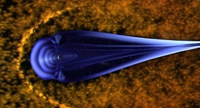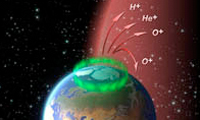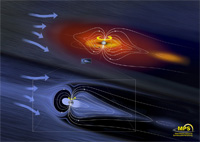Recent scientific highlights
Monitoring the impact of extreme solar events
Combined observations with the six Cluster and Double Star spacecraft have allowed scientists to monitor in detail the impact of extreme solar events in the near-Earth environment. (See related ESA top story.)

Cluster's insight into space turbulence

The four Cluster spacecraft have revealed, for the first time, how turbulence develops in space just outside the Earth's magnetic environment. Plasma turbulence is a key process to understand since it is a major showstopper for fusion reactors to function on Earth, a new sustainable way to produce energy. (See related ESA top story.)
Cluster detects invisible escaping ions
Cluster data have revealed that thousands of tons of hydrogen escape from the Earth's atmosphere annually. The escaping hydrogen has previously been invisible to classical particle detectors on satellites due to its very low energy. (See related ESA top story.)

Looking at Jupiter to understand Earth

Magnetic substorms observed at Jupiter have recently been compared with those that occur at Earth, shedding new light on this phenomenon. This study was based on data obtained with the ESA Cluster and NASA Galileo spacecraft (image copyright: J. Herting/Max Planck Institut fur Sonnensystem-forschung). (See related ESA top story.)
